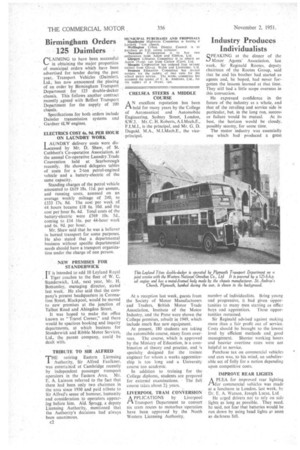Birmingham Orders 125 Daimlers
Page 40

If you've noticed an error in this article please click here to report it so we can fix it.
CLAIMING to have been successful in obtaining the major proportion of municipal orders which have been advertised for tender during the past year, Transport Vehicles (Daimler). Ltd., has now announced the placing of an order by Birmingham Transport Department for 125 double-decker chassis. This follows another contract recently agreed with Belfast Transport Department for the supply of 100 chassis.
Specifications for both orders include Daimler transmission systems and Gardner 6LW engines.
ELECTRICS COST 6s. 9d. PER HOUR ON LAUNDRY WORK
I AUNDRY delivery costs were disLacussed by Mr. D. Shaw, of St. Cuthbert's Co-operative Association, at the annual Co-operative Laundry Trade Convention held at Scarborough recently. He showed delegates tables of costs for a 2-ton petrol-engined vehicle and a battery-electric of the same capacity.
Standing charges of the petrol vehicle amounted to £619 18s. 11d, per annum, and running costs, assessed on an average weekly mileage of 240, to £333 I7s. 8d. The cost per week of 44 hours became £18 bs. 10d. and the cost per hour 8s. 4d. Total costs of the battery-electric were £769 10s. 5d., coming to £14 16s. per 44-hour week and 6s. 9d. per hour. Mr. Shaw said that he was a believer in horsed transport for some purposes. He also stated that a departmental business without specific departmental needs should have a transport organization under the charge of one person.
NEW PREMISES FOR STANDERWICK
IT is intended to add 10 Leyland Royal
Tiger coaches to the fleet of W. C. Standerwick, Ltd., next year, Mr. H. Bottomley, managing director, stated last week. He also said that the company's present headquarters in Coronation Street, Blackpool, would be moved to new premises at the junction of Talbot Road and Abingdon Street.
It was hoped to make the office known as "Travel Corner," and there would be spacious booking and inquiry departments, at which business for Standerwick and Ribble Motor Services, Ltd., the parent company, could be dealt with.
TRIBUTE TO SIR ALFRED rTHE retiring Eastern Licensing Authority, Sir Alfred Faulkner, was entertained at Cambridge recently by independent passenger transport operators in the Eastern Area. Mr. E. A. Lainson referred to the fact that there had been only two chairmen in the area since 1930 and paid tribute to Sir Alfred's sense of humour, humanity and consideration to operators appearing before him. Ald. Spragg, a deputy Licensing Authority, mentioned that the Authority's decisions had always been unanimous.
c2 CHELSEA STEERS A MIDDLE COURSE
AN excellent reputation has been held for many years by the College of Aeronautical and Automobile Engineering, Sydney Street, London, S.W.3. Mr. C. H. Roberts, A.I.Mech.E., F.I.M.I., is the principal, and Mr. G. D. Duguid, M.A., M.I.Mech.E., the viceprincipal.
At a reception last week, guests from the Society of Motor Manufacturers and Traders, British Motor Trade Association, Institute of the Motor Industry, and the Press were shown the College premises, rebuilt in 1949, which include much fine new equipment.
At present, 180 students are taking the automobile course, many from overseas. The course, which is approved by the Ministry of Education, is a combination of theory and practice, and is specially designed for the trainee engineer for whom a works apprenticeship is too long and a University course too academic.
In addition to training for the College diploma, students are prepared for external examinations. The full course takes about 2i years.
LIVERPOOL TRAM CONVERSION
A PPLICATIONS by Liverpool -t-Transport Department to convert six tram routes to motorbus -operation have been approved by the North Western Licensing Authority.
Industry Produces Individualists
SPEAKING at the dinner of the Motor Aunts' Association, last week, Sir Reginald Rootes, deputy chairman of the Rootes Group, said that he and his brother had started as agents and, he hoped, had never forgotten the lessons learned at that time. They still had a little scope overseas in this connection.
He expressed confidence in the future of the industry as a whole, and that of the retailing and service side in particular, but, in the long run, success or failure would be mutual. At its best, the horizon would be cloudy, possibly stoimy, for some time.
The motor industry was essentially one which had produced a great number of individualists. Being young and progressive, it had given opportunities to many men starting as office.
boys and apprentices. These opportunities remained.
Sir Reginald advised against making more than a fair profit out of service. Costs should be brought to the-lowest level by efficient methods and good management. Shorter working hours and heavier overtime rates were not helpful to service.
Purchase tax on commercial vehicles and cars was, to his mind, an unbelievable act of folly for a nation depending upon competitive costs.
IMPROVE REAR LIGHTS
APLEA for improved rear lighting for commercial vehicles was made at a luncheon in London, last week, by Dr. E. A. Watson, Joseph Lucas, Ltd.
He urged drivers not to rely on side lights as long as possible. They need, he said, not fear that batteries would be run down by using head lights a. soon as darkness fell.




























































































